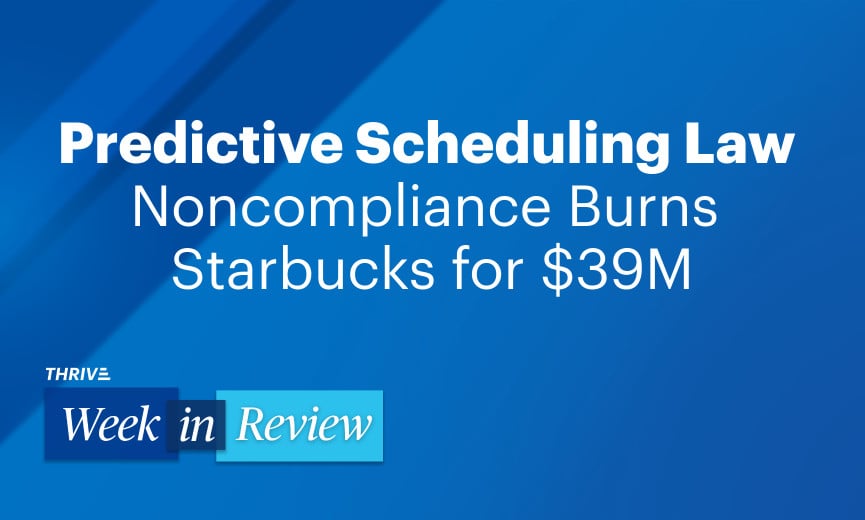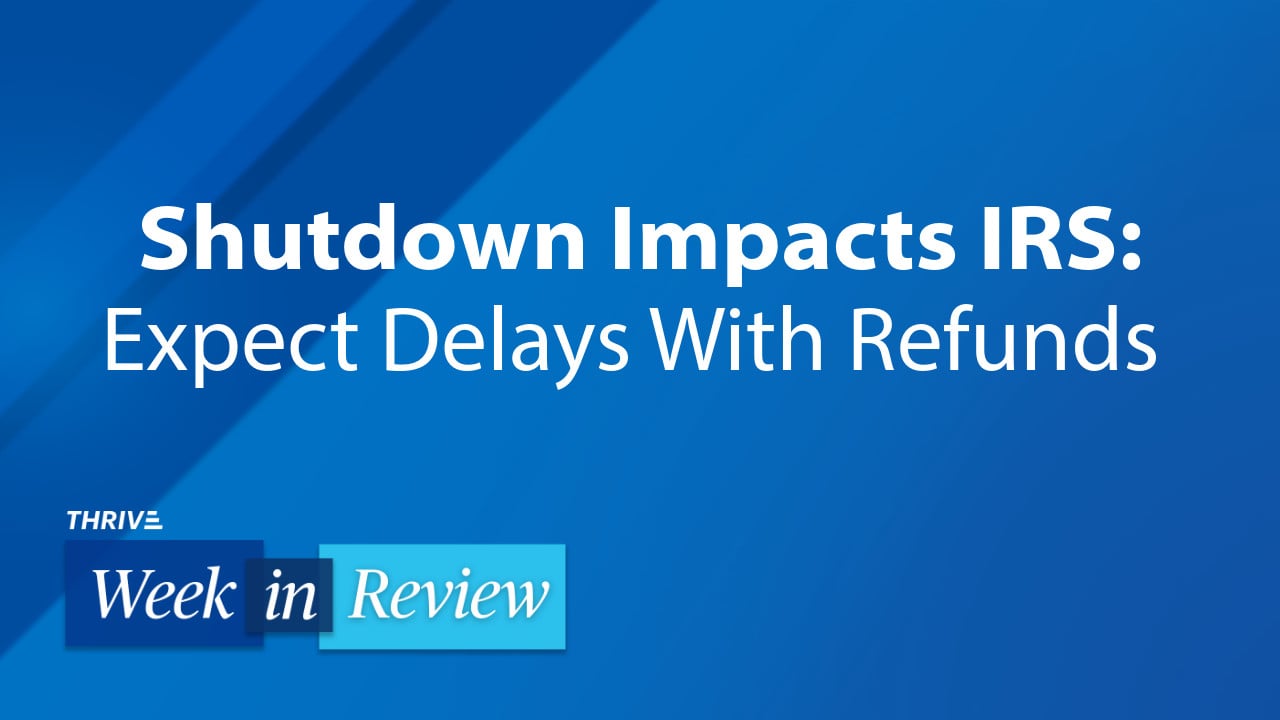- Thrive
-
Season
4Episode63
What Will Be Threshold for OT Rule? Who Suffers from Writers’ Strike? Will R&D Tax Credits Return?

Podcast •

Summary
Whispers out of Congress, according to Gene Marks, say the new salary threshold for the OT Rule could be $80,000, but Gene hints that $60k is more in the ballpark. Meanwhile, as the writers’ strike continues, businesses that need that foot traffic suffer the most. Other businesses are taking a hit after the loss of the R&D tax credit and another key credit. What are businesses to do? Listen to the podcast.
View Transcript
[Gene Marks, host]
Hey, everybody, this is Gene Marks and welcome to this week's episode of the Week in Review, a Paychex THRIVE podcast. This is where I take a few bits of news from the previous week and give you some of my interpretations as how that impacts both your business and mine. So, let's get to it, shall we?
The first piece of news has to do with the overtime rule that's circulating at the Department of Labor. This was reported on hospitalitynet.org. The acting Secretary of the Labor Department, Julie Su, who's by the way, she is still nominated to be Labor Secretary, but it's in limbo right now while the Senate and Congress gets their act together to try and approve her. But putting that aside, she has been, you know, in the midst of a potential change to overtime rules and I want to make sure that you're aware of what's going on.
Right now, if you pay a salaried worker who's not supervising anybody who has a certain type of job title and meets certain types of qualifications and is earning more than about $35,000 — I think it's $35,568 annually — that worker is not entitled to overtime. So, even if the person puts in 45 hours a week, you don't have to pay them for any overtime.
Well, right now, the Department of Labor is going through its process to change that rule to basically up that salary level. Some of my people that I talked to in Congress are actually saying that that level could go up to as high as $80,000 a year. I don't think it's going to reach that high — this is my opinion — I think it's going to be somewhere in the $60,000 range.
The bottom line is that overtime wages are likely to increase, which means that same worker — remember, it's somebody that's salaried, somebody that's generally not supervising anybody. They have certain titles, meet other qualifications — if they're making, you know, a certain amount of money under a certain amount of money, and I think it's going to be around 60 could be around 80, you have to pay them overtime for any hours worked over 40 hours a week.
Remember, the Department of Labor is not going to audit you. That employee will report you if they feel that you're in violation of that rule because they get the Internet, too. So right now, there was a letter that was written from some Republican senators and representatives that are urging the Department of Labor to not do this. Right now, we don't know what the plan is, but my expectation is that the rule is still going to go through.
So, prepare yourself. This is something I think that will happen in 2023 and could have a significant impact on the wages that you are paying some of your employees.
The second bit of news has to do about the Hollywood writers’ strike. As you know, it's been going on now for a few weeks. This has been reported in the L.A. Times, at latimes.com, and unfortunately, you know, when you think about the writers’ strike, you think about, you know, missing out on your favorite shows or the fact that, like a lot of the production in Hollywood has been brought to a halt until they get this strike resolved.
Well, you know, many of us don't think about the indirect impact of strikes like this. And, the fact of the matter is that in L.A., there were a lot of restaurants and coffee shops and dry cleaners and other, you know, other small businesses that are located around the big production studios like Warner Brothers and Disney and ABC that are really losing out. Some estimates say that the writers’ strike is costing the local economy $30 million a day, which just gives you the impact of what happens when there is a strike.
Whenever there is a strike anywhere — I remember the same thing with the baseball strike — if your airline pilots go on strike, any organizations, there's always small businesses that suffer because when employees aren't working or staying at home, they're not spending money or organizations have to contract because of it or respond because of it. There are many, many small businesses that are impacted by that.
So, you know, again, this strike, the news is that there is a writers’ strike going on. The real impact, though, in my opinion, is on a lot of the small businesses that depend on this industry for their livelihoods. So, let's hope that this strike gets resolved as soon as possible.
I have no advice there other than to those business owners to try and hunker down and hopefully they can weather the storm until the strike eventually does get settled.
Finally, as reported by the House Small Business Committee, this is at smallbusiness.house.gov, the recent House hearing was held that is addressing certain tax policies that are hurting small businesses right now and I want you to be aware of them.
There are two big ones that — two big tax deductions —that have gone away for small businesses just this year. And I'm talking to you as an accountant here. For starters, the research and development tax deduction — the ability to deduct in the year you have incurred research and development costs — starting last year in 2022, that deduction in the field where you could immediately do that one year was changed. It went back to old rules, which means you have to amortize those costs over five years.
That caused some issues for some of my clients who were expecting to get this deduction, didn't get the deduction, and wound up owing more taxes. So, this year in 2023, if you are incurring research and development costs — and by the way, many businesses, you have to be a pharmaceutical company to take advantage of R&D deductions or you can be in manufacturing and service businesses, too, — just be aware right now you can't deduct all those costs in the year you've incurred. You can only deduct 20% of them now and you have to defer the rest over the next four years.
The second big tax deduction that's declining this year is for depreciation. Previously to this year, if you bought capital assets like equipment and machinery, you could deduct 100% of it in the year that you bought it — that's called bonus depreciation. Well, now you're limited to 80% in the year that you bought it. You have to amortize the rest over the life of the asset. Next year it goes down to 60%.
So, therefore, if you're looking to buy fixed assets this year, like furniture, equipment, machinery, you want to buy it this year to at least get an 80% reduction in the year that you've purchased it because if you wait until next year, you're only going to be able to deduct 60% in the year that you have purchased it.
Now, there is hearings going on among the House subcommittee trying to get this changed, trying to get these tax deductions put back into place. Hopefully, that will happen, but right now, I have not seen any significant movement on that behalf. So, talk to your tax account now and make sure you're making your plans.
That's the news for this week. You've been listening to the Week in Review. My name is Gene Marks. This has been a Paychex THRIVE podcast. If you've got any advice or tips or would like to suggest a guest, please visit us at our Web page payx.me/thrivetopics.
I'll be back with you next week with three news items that I think are important for your business and why they're important for your business. We'll discuss them then. Thanks very much for your time. We'll see you next week.
This podcast is property of Paychex, Inc. 2023. All rights reserved.

 Apple Podcast
Apple Podcast Spotify
Spotify iHeartRadio
iHeartRadio








